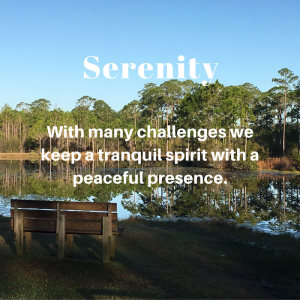
Serenity

Description
Serenity is tranquility of spirit. It is an abiding sense of trust and faith that all is well. In the midst of trials, we are accepting and resilient. We go with the flow. We practice stillness, reflection, and mindfulness. Serenity gives us lucidity of thought and allows us to detach from strong emotions that can cloud our judgment. We do not allow worry or fear to throw us off balance. We cultivate peaceful presence. We are able to be the calm in the wind.
Quote
“God grant me the serenity to accept the things I cannot change, the courage to change the things I can and the wisdom to know the difference.”
— Reinhart Niebuhr
The Practice of Serenity
- I have faith in the goodness of life.
- I accept tests with grace and trust.
- I am flexible in the course of events.
- I am thoughtful and reflective.
- I keep my peace.
- In the midst of chaos I create tranquility.
Definitions and practices of virtue are used with permission from the Virtues Project™.
In Family Life
In the realm of family life, the virtue of serenity manifests as a collective sense of tranquility and trust. It is when family members embrace an unwavering faith that, no matter the challenges they face, all will ultimately be well. In times of trials and tribulations, serenity is demonstrated through acceptance and resilience, as the family gracefully adapts to the ebb and flow of life’s uncertainties.
Within the family unit, stillness, reflection, and mindfulness are not just practices; they become a way of life. Serenity bestows upon each member the clarity of thought needed to navigate difficult situations, enabling them to detach from overpowering emotions that may obscure their judgment. It is a shield against the disruptive forces of worry and fear, allowing the family to maintain its balance.
Cultivating a peaceful presence collectively, they become the calm amidst life’s storms, radiating serenity as a guiding light for one another.
Balancing Serenity
To maintain a healthy balance of serenity, several other virtues can be of great assistance:
-
-
- Courage: Courage allows us to confront challenges and conflicts with a clear mind while still staying serene. It helps us act when needed rather than passively accepting unfavorable situations.
- Wisdom: Wisdom enables us to discern when it’s appropriate to be serene and when action is required. It guides us in making informed decisions, free from excessive emotional influence.
- Compassion: Compassion reminds us that serenity doesn’t mean indifference. It encourages us to maintain empathy and care for others while staying calm, even in difficult circumstances.
- Resilience: Resilience complements serenity by helping us bounce back from adversity. It ensures that the storms of life do not shatter serenity but rather remain a steady force.
-
In pursuing serenity, let us remember that, like all virtues, it thrives in balance. It’s not about being emotionless or constantly in turmoil; it’s about finding the equilibrium that allows us to navigate life’s challenges with grace and peace. So, let serenity be your anchor, but let courage, wisdom, compassion, and resilience be your guiding stars in maintaining that cherished balance.




